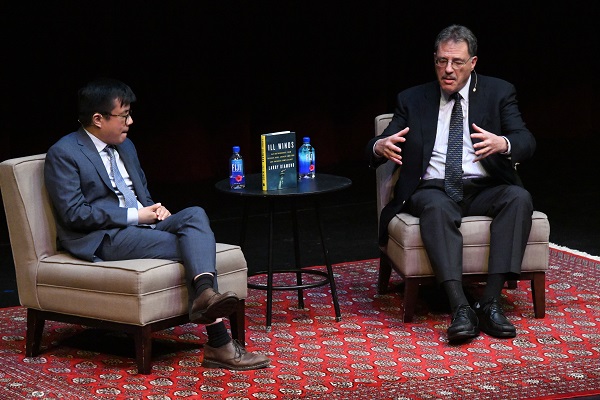 Dr. Larry Diamond (r) in discussion with moderator Sewell Chan of the LA Times
Dr. Larry Diamond (r) in discussion with moderator Sewell Chan of the LA Times
On June 11th, the Los Angeles World Affairs Council hosted Dr. Larry Diamond, an expert in democratic studies and comparative politics at Stanford’s Hoover Institution and Freeman Spogli Institute, to discuss the state of democracy around the world as undemocratic states like China rise in their global influence, once stable democracies trend towards illiberalism or authoritarianism, and “democracy building” is generally seen as shorthand for U.S. military intervention.
Dr. Diamond spoke of a “democratic recession” beginning in about 2006, spurred on in part by the “democracy by force” put forth by the Bush Administration, notably demonstrated in Iraq and, to a lesser extent, Afghanistan. This democratic recession reached an inflection point following the financial crisis in 2008, as the recession supposedly demonstrated that those in power couldn’t be trusted to ensure stability and growth; that the elites and political leaders were out of touch, corrupt, and couldn’t be trusted.
Meanwhile, China continued its rise, hosting a successful Olympic Games, and Russia reemerged as a global power. To this day, China and Russia work to prove – falsely – that their political models are viable alternatives to liberal democratic, market-based models of the United States and much of The Americas, Europe, Japan, and our allies.
Dr. Diamond referenced his colleague Francis Fukuyama’s “The End of History” on the collapse of the Soviet Union proving that people around the world prefer open, market-based democracies to closed, state-directed authoritarian regimes. Though imperfect, democracies rarely see famines, don’t commit human rights abuses to the scale of dictatorships, and typically allow for the personal freedoms most important to our identities and culture.
We were conditioned to the constant democratic expansion of the 20th Century, and seeing this democratic recession is a departure from that norm and has many folks worried – and rightly so. However, Dr. Diamond tells us not to worry. “There’s no Hitler,” he reminds us, and even with the likes of Xi and Putin attempting to provide an alternative model – and Orban and Erdogan pulling back from the liberal democratic model – open, market-based democracies are the preferred model of governance by people around the world. We can look to Hong Kong and Sudan – currently seeing mass protests against the perceived authoritarian influence of Beijing and the Communist Party, and the military seizing government and refusing to lead the previously-promised shift to democracy – to see the global desire for governments led by the people, for the people.
